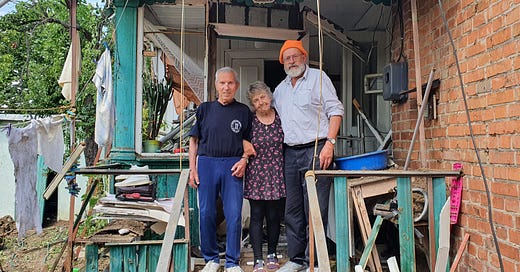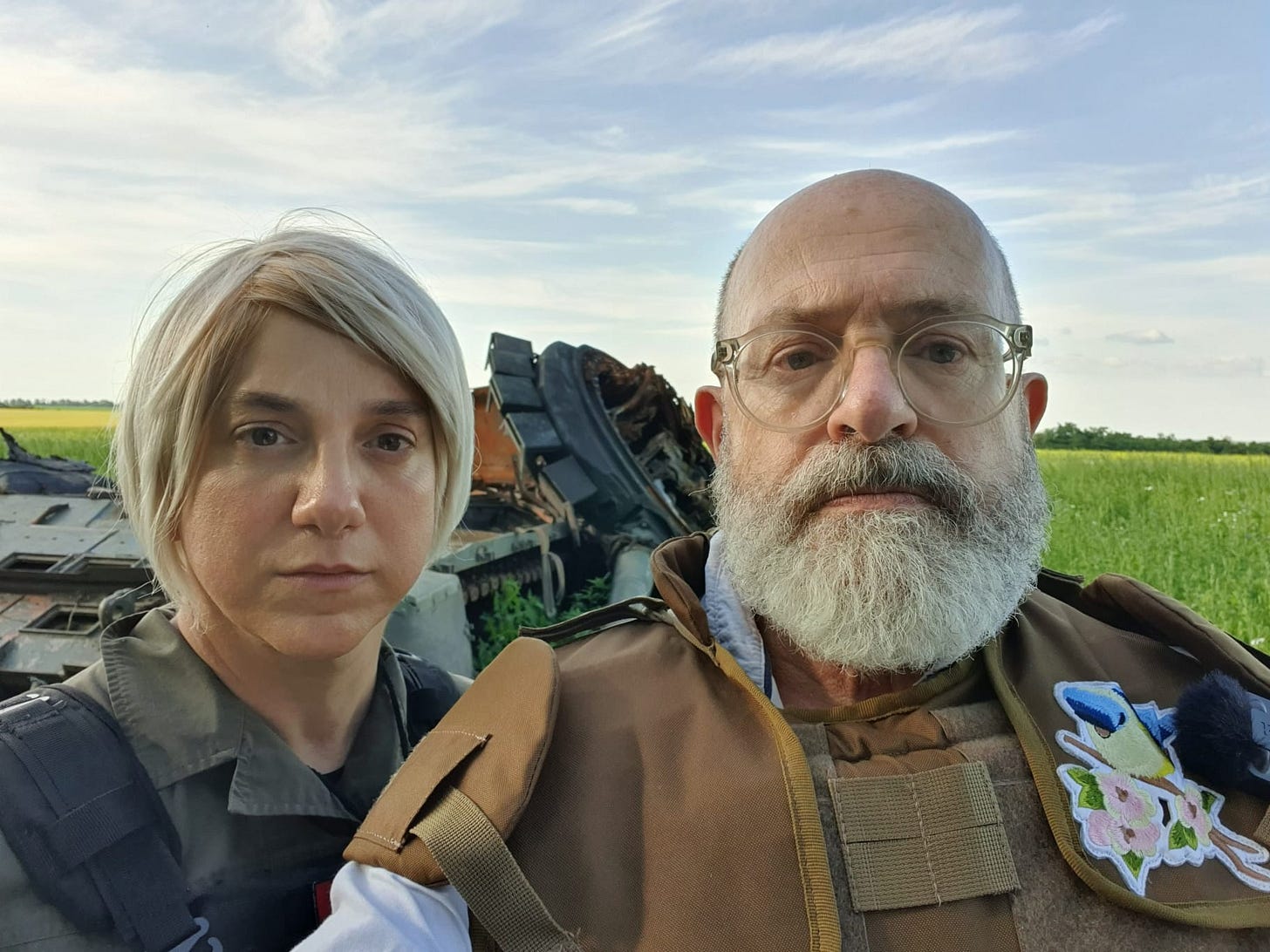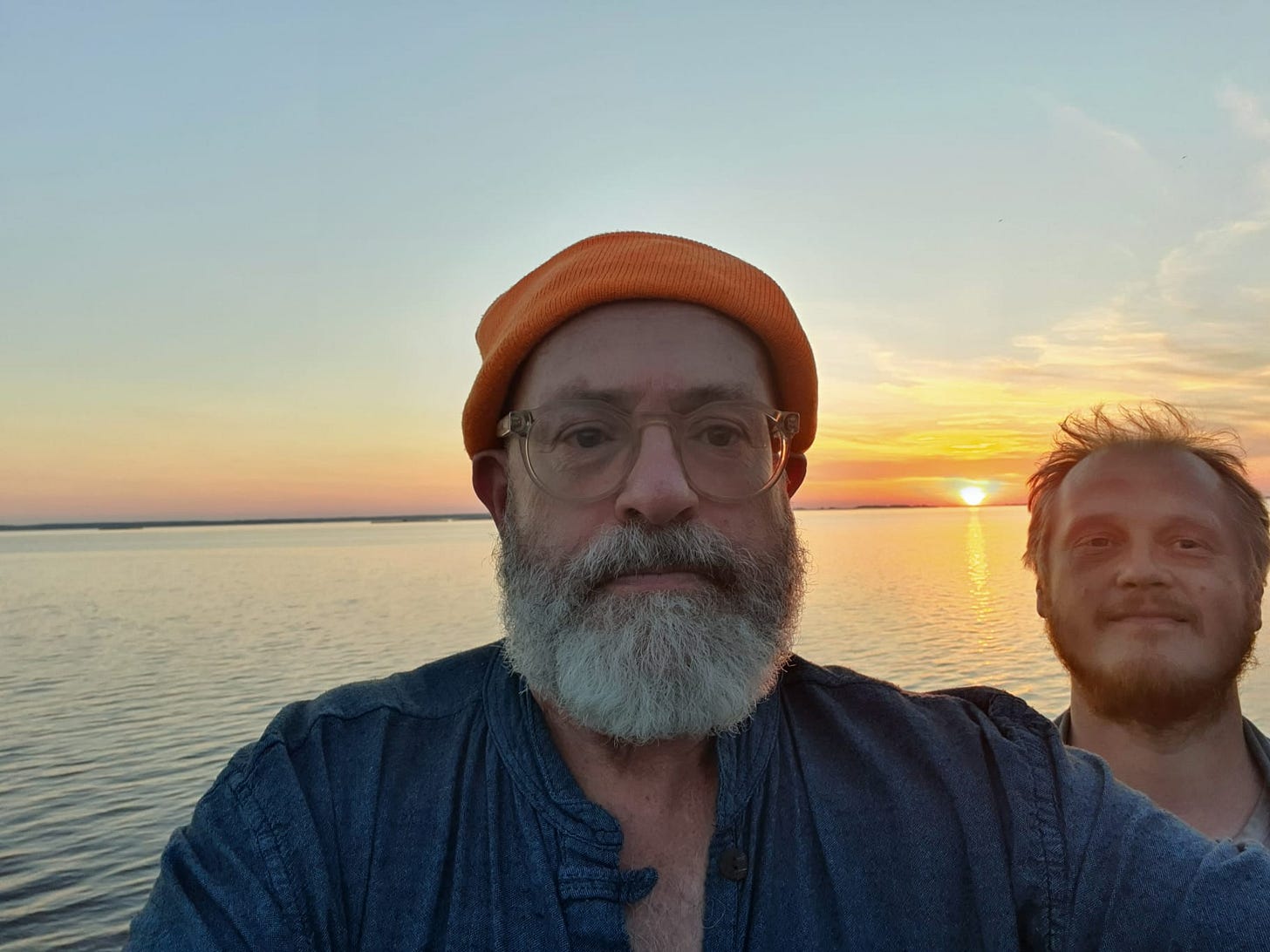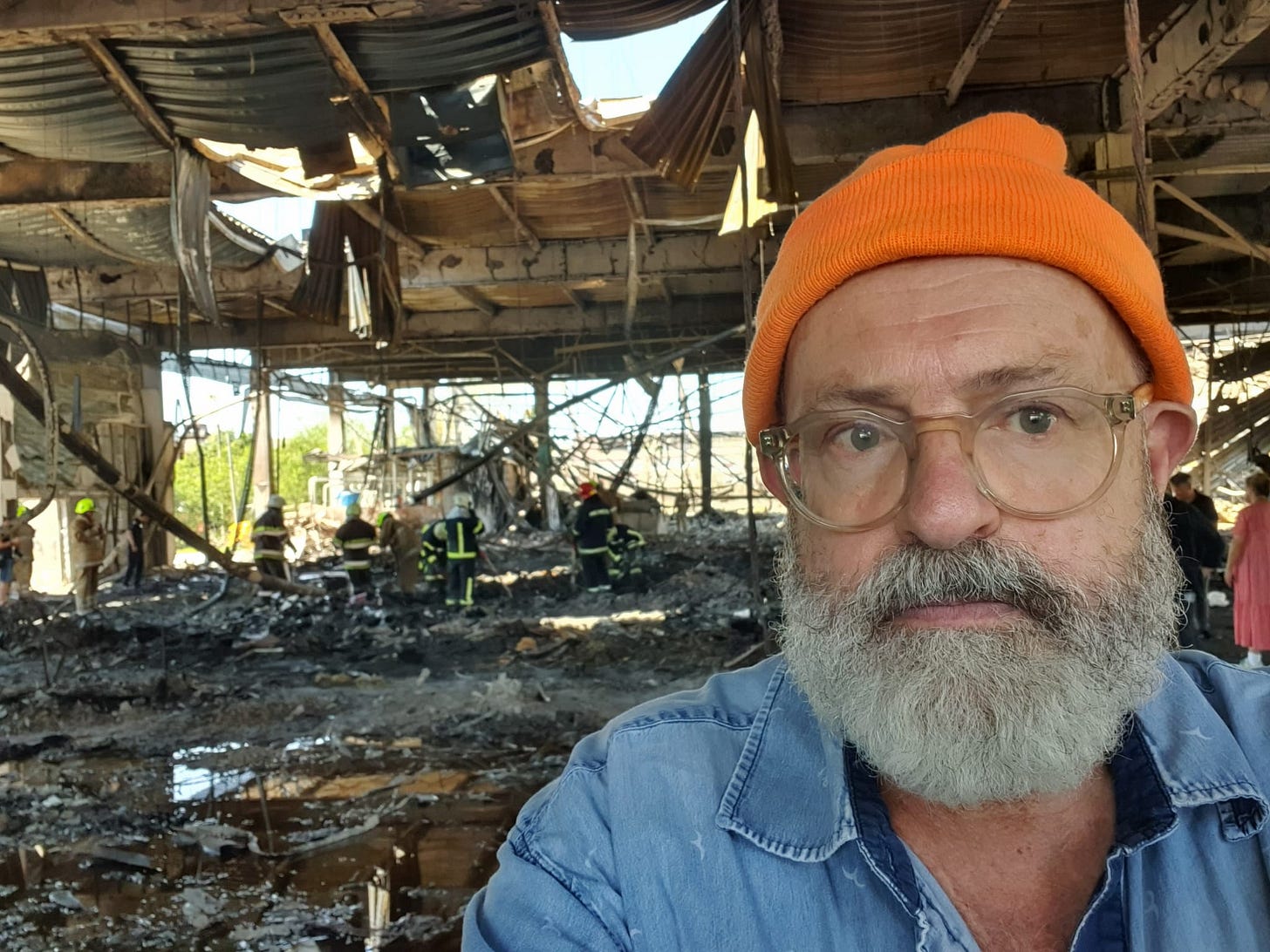Kyiv. She comes at me from the thick of the memorial service, her extraordinary beauty disfigured by her grief at the loss of Roman Ratushnyi. He was just 24, handsome, fastidious, famous for protecting a strip of woods in the centre of the city from a property developer predator. Roman defied arrest, trumped up charges of hooliganism and outgunned his powerful enemies with wit, courage and his law degree. He fought the Russian Army with the same panache as he fought bent money in Kyiv. “The more Russians we kill right now, the fewer will be left for our children to kill,” was a line he wrote on Twitter which gave the platform the heebie-jeebies. Perhaps war did something dark to his soul. War does that to everyone, everywhere. He died out east, consumed by the Russian meat-grinder. Roman’s funeral is bleak as bleak can be. The image of the weeping beauty captures something hard and bitter about Vladimir Putin’s brutal and stupid war, a moment of spiritual exhaustion at the price in Ukrainian blood of fighting the Kremlin’s killing machine. But I am a writer not a photographer and I don’t have the cold professional steel to take the shot. She walks by me, annihilated by loss.
Kharkiv, eastern Ukraine. The Russian Army is 15 miles away, if that. The border with Russia is only 25 miles away. It’s one o’clock in the morning. I’m hanging out with my pals who have come along for the ride, Max, the owner of the Buena Vista bar in Kyiv, his friend Vovo, who teaches physics at Kyiv Poly, Matej and Tomas, two journalists from Slovakia. Max has brought along some scotch and we’re counter-attacking the bottle hard when: incoming. They hit the city 40 times that night.
In the morning we have breakfast and then go looking for some of what the Russian Army has done. At the first bombsite, we see what’s left when a Russian “Hurricane” missile hits a council estate. The Hurricane is half-shell, half-rocket, punching high, higher than Mount Everest, then falling to earth with a bang. It came in, clipping the top of one of a block of flats, before barrelling into a car park, frying dozens of cars, flipping one on its back like a turtle, and blasting a hole in the tarmac as deep as an upended coffin. Amazingly, no-one was killed.
At a second bombsite, we come across a salon called Beauty Home. On a wall is a picture of a stylised Ukrainian beauty gazing at you, her shoulders bare; behind the wall the rest of the salon has been blasted to bits. A digger shovels the rubble out of the road. The Ukrainians have a thing about making the place tidy as soon as possible. It’s yet another example of their grace under pressure.
At the third bombsite, the missile plunged into a dirt road, smashing windows and masonry and roofs all around, and digging a hole so deep you could lose a London bus in it. The missile hit a water-main which burst so Vladmir Putin has created a pond at the end of the lane. Alla, in her sixties, was sleeping in her pretty wooden cottage when the missile blasted the road, a good chunk of her front garden and her greenhouse to kingdom come. She was saved by the two wooden doors between her and the Kremlin’s heavy metal. Her father, Leonid, in his 80s, spent his whole life working in the Soviet rocket industry so this, he says, was a present from his former work colleagues.
To talk to them, I have to walk over broken glass and splintered wood and blasted herbs. I tell them that Vladimir Putin has left them a new fishpond. “It’s not just Putin’s fault. Along with him, there are too many other people, other criminals.”
Caption: Alla and Leonid
Alla’s thoughts echo Roman’s. Hatred of Russians is now a common reaction in Ukraine, that not just Putin but the people too are monsters. This happened during the second world war in Britain. To begin with people hated Hitler but not the Germans. As the war dragged on and more and more lives were lost, sympathy for the German people started to wither.
The moment I hear Alla I start thinking of four Russians I knew: Anna Politkovskaya, Natasha Estemirova, Boris Nemtsov, Alexei Navalny.
Poisoned, later shot.
Shot.
Shot.
Poisoned, now in jail.
I believe, passionately, that there is another Russia. But all the good Russians I know who fought the Kremlin have been poisoned or shot or jailed or fled so now there seems to be no-one left. When Ukrainians, bombed, blasted, their friends and lovers killed, call all Russians monsters, I disagree, but my minority report seems more feeble and foolishly esoteric by the day.
The bleak news is that Russia still trembles under Vladimir Putin’s boot and, bleaker yet, as he spills so much blood in Ukraine, as he generates hatred for all Russians, as the idea of another Russia recedes into gloom, it feels like he is winning.
In Kharkiv, having seen enough civilian targets smashed to bits, we go towards the front-line, get blocked at a Ukrainian army checkpoint - the first days of the Battle of Kyiv when you could go anywhere you pleased have long gone - and I call someone who I have only met through social media.
Sarah Ashton-Cirillo is a reporter and writer who moved to Kharkiv in March and now lives in Saltivka, the most dangerous suburb in the city, from where she commutes to Zolochiv, a big village only seven miles from the Russian border, where she is a kind of deputy mayor. Simply by filming and writing what she sees every day, she is a hero of our time. Sarah is trans, originally from Las Vegas – of course, she’s from Las Vegas - and hated by the Kremlin. When the Russian Foreign Ministry spokesman Maria Zakharova slagged her off, saying that she was the trans from Las Vegas who hung out with gangsters – meaning the Ukrainian Army – she became a local celebrity overnight. My Slovak pals and I pile into her tiny car and, with Max and Vovo following, we sail through the Ukrainian Army checkpoints out of Kharkiv, keeping the Russian Army to the right, and once again, I am struck by the otherness of war.
In the middle of a wide road lies a van, skewed across the asphalt. Compared to Kyiv, which is almost but not quite back to a pre-war normal, Kharkiv is nigh-on empty. You can get killed by a Russian Cruise missile anywhere in Ukraine but the odds of that happening are pretty remote. Russian artillery is good for fifteen miles to twenty miles, so Putin’s killing machine is too close for comfort to Ukraine’s second city. One million people, more, have gone away. We drive along empty streets, past apartment blocks burnt to a crisp, smashed coffee shops, clocking how war shuffles civilisation’s pack. The big Russian shells produce a pressure wave so great that they flip cars on to their backs as if they are toys and Sarah points out yet another car-turtle, the second one I see that day, this one having been back-flipped onto the top of a garage.
Living where she does, doing what she does, she is taking serious risk every day. I say that people think that I am crazy, but she’s crazy-crazy. She laughs and replies: “I'm a writer. And sometimes we get caught up in moments that we know will never come again. I came here to write about refugees. I had never experienced war before. I had never experienced combat. I most definitely had seen tragedy., I was not a war journalist or correspondent. And then all of a sudden overnight, I became a war journalist. That's the only way to put it. And I guess my personality, as a student of Hemingway, student of Orwell, of Gellhorn, understood what this meant. And so I just tried to put out of my mind what it is beyond the fact that I'm covering the story. And I am, you know, and I've made it clear to my readers as early as March that they were not going to be getting equal coverage. They were going to be getting the facts. But the facts were already by that point, I had seen the horror of what Russia had been doing.”
I cut in: “it’s not equal. I'm saying this as a former BBC journalist, there is no there is no duty of impartiality to fascism. This is like 1939-45. And to see it any differently is entirely and utterly wrong. Full stop. These people were at peace. They're not Nazis at all.” Sarah tells me she loves me and I tell her that she’s not my type and we laugh and hit the road, driving out of the city into the rolling steppe.
I ask her how the Ukrainians have been with the fact that she is trans? “They don't care,” Sarah says, “I told the BBC, when they interviewed me, it's better to be trans here than in the United States. We're focused on freedom, democracy and liberty.”
I tell Sarah that back in the day, in 1988, I went undercover to Prague and hung out with the Czech opposition: Vaclav Havel, funny, wry, a chain-smoker with a terrible cough, like Mr Wheezy from Toy Story, within a year about to go from disgraced dissident jailbird to President; Jerry Djientsbier, his sidekick and loyal ally and a third man, the writer, Ludvik Vaculik, who, with his gorgeous irony, used to annoy the secret police something rotten. Vaculik wrote: “human wisdom is about respect for the beautiful, the unobtainable and simply the different.”
That respecting the other – people like Sarah - is what Ukraine is fighting for, along with the other stuff. And Vladimir Putin will never understand this, but the side that looks after the other is never, ever going to give up.
As we drive, a slow, sad, sound comes off the road. Tanks have been this way, lots of them, and their metal tracks have bit into the asphalt so that when our tyres hit the corrugations it makes a song, like that of whales at sea. I last heard this tank music in former Yugoslavia and I start thinking about my dead friend Paul Jenks…
The land is a frozen ocean, long rolling waves of black earth breaking in ridges, three miles apart. The first ridge to our right is held by the Ukrainian Army. The next one along is in Russian hands. Every now and then we see a plume of grey smoke rise up, where a shell has started a fire in the cornfields. We stop and plan to walk a little way towards the front-line. For the first time in months I put on my flak jacket with punishingly heavy plates, front and back, and carry my helmet, just in case. Max looks up where we are on the state-of-the-art map showing the frontlines and elects not to go on this particular walk. He kept the Buena Vista open throughout the Battle of Kyiv when martial law forbad the sale of alcohol, so he’s no coward. Sarah takes us up a muddy track for fifteen minutes. She shows us two Russian armoured personnel carriers and a Russian tank, their heavy metal burnt yellow. The Ukrainians buried two Russian soldiers in a simple grave, marked by a stick. We record a video diary for my Twitter, @johnsweeneyroar, telling Vladimir Putin a simple message: “Do Fuck Off!”
Caption: Sarah Ashton-Cirillo and I. The Russian Army is so close I took my lucky orange hat off.
But the melancholy of the little grave sticks with me as we walk back to our cars.
In Zolochiv, seven miles from the Russian border, you can feel the weight of the enemy next door bear down on you. Sarah has used her rock star status to help the community: “we've brought thousands of pounds of food, significant quantities of medicine, gas masks, bulletproof vests. We've also worked to get the International Red Cross here.”
Sarah shows us the smashed up remains of the little community hospital. The Russian gunners tried to finish it off but their aiming was off, so they hit a house, blurring out a few more lives. She explains: “Three people died, they were dismembered. They found a head and two different legs.”
Beyond the rubble, a child plays on a swing. The poor can’t afford the expense of being a refugee, so they stay and live or die. Fifty of the villagers have been killed. At least one or two people here are telling the Russian gunners their aim is off. Here, at the sharp end, you don’t feel safe because you are not.
We stumble across a puppy and I give it some water and Sarah picks it up and puts in her helmet and then its frantic owner appears and a sweet moment when we kind of forget about the war is snuffed out.
Sarah and puppy
The next day Max, Vova and I drive across half the country, from the east to the capital. In early evening, as the sun starts to dip, just as we hit Kyiv the news comes that a Russian Cruise missile has smashed into a shopping mall in Kremenchuk. Max and I head there: it’s five hours by road back the way we had just come.
Max and I on the road to Kremenchuk
A jackhammer is smashing into some concrete so that rescuers can get at the human remains beneath. Ahead of me a gaggle of firemen are sifting through the wreckage looking for bones. Flesh and fat would have vapourised. As ever, not everything is destroyed. There’s the remains of a cash machine, some books, paperwork which managed to withstand the fire; a filing cabinet; pipes. Pretty much everything else is charred black. I’m recording for the final episode of my podcast, Taking On Putin, and the smoke and the smell, the smell of death, gets to me and my eyes close and I say: “forgive me, I can't, I can't find the fucking words to describe this shit. The problem for me psychologically is I've seen this before in Chechnya 22 years ago, and then I saw it in 2014. MH17: all this aircraft luggage in the middle of nowhere in eastern Ukraine shot down by a Russian service to air missile.”
They hit the mall with X-22 missile, chock-full of technology from 1962.
“You send a rocket that old here to a city of 200,000 people. It's very likely that you're gonna kill a whole bunch of innocent people and that's what happened. Dear God, God I'm sorry. I can't find the fucking words.”
Kremenchuk
There’s a line in John Le Carre’s great thriller about the Cold War, The Spy Who Came In From The Cold, when Control asks Alec Leamas whether he has the human version of metal fatigue. Leamas soldiers on and goes back east but he had metal fatigue. After almost half a year of war, so has Ukraine. The weight of Vladimir Putin’s killing machine gets to you. I have got metal fatigue. So has everyone else I know in Ukraine. And that, too, is a kind of victory for Vladimir Putin.
I catch up with my old friend Vlad Demchenko, the soldier who arrested me on Day Two of the war for being a Russian spy – “Do I look like a Russian spy?” He’s now a lieutenant in the Ukrainian Army Volunteer Corps. First of all, I ask Vlad for his reaction to a letter from twenty German intellectuals calling for Ukraine pretty much to throw in the towel.
Vlad Demchenko
He replies: “I'm tired of these people to be honest. It's bizarre. My house was occupied by Russia for a couple of months. So literally, some German idiot is proposing for me to to make peace with somebody who took my home away. Fuck you. I'm so angry at this moment.”
I tell him about Alla looking at Putin’s fishpond at the end of the lane, saying it’s not just Putin, it’s the Russians too. Does he agree with her?
He does, very much so: “The Russian opposition are not fighting.” But Vlad is vexed by Western timidity too: “Western countries already forgot their history. They forgot those times when they fought for their freedoms. They lose connection to reality. We are suffering from fucking murderers, maniacs. There is a war between an autocratic dictatorship and the free world and Ukraine really want to be a part of this free world. And when I hear from somebody in the free world, telling us that we should give up, I really doubt this free world exists, to be honest.”
The war has changed. Russia lost the Battle of Kyiv because it threw too few soldiers at the Ukrainian capital; Russian soldiers lacked a good reason to fight; their logistics were rubbish and their leaders were, in both senses of the word, bad: incompetent and evil. But then Vladimir Putin adapted to reality, pulling his forces out of the north, putting them in the east where the Russian Army’s advantages in artillery and manpower paid off. Slowly, pitilessly, the Russian meat-grinder has advanced and far too many good Ukrainians are dying, and that, too, feels like a victory for Vladimir Putin.
Vlad Demchenko fears that as the price of oil and gas goes up, and Russia blockades Ukrainian grain from the developing world, the West will chicken out, a frozen peace will be unjustly enforced on Ukraine and, some time in the future, Vladimir Putin will switch his killing machine back on: “I'm afraid that my life now, it's the life of the soldier and I don't choose this destiny for myself but I see that what we expect to receive from the western world is just not enough. So my prognosis that they will freeze this war at end of this year, and Vladimir Putin will be winning.”
I tell him that’s fucking depressing.
“Do you know John by from 24th of February, more than 20 people I know have been killed? Most of them between 20 and 30, smart people, nice, funny. I don't even count those who were wounded, who lose their legs, who have metal shrapnel in their bodies.”
The day after this interview one of the guys in Vlad’s battalion was killed and it was his duty to inform the family. The metal fatigue in this war is real. So is moral fatigue. There is no sign that the Kremlin’s lie factory is shutting up shop and that worries Vlad greatly.
“The worst part of this John is actually that Putin is using your strengths against you by paying his puppets.”
Vlad sees more division in the West, encouraged and paid for by the Kremlin. His own future looks grim: “I have one life here in this world. And why I should spend it fighting some idiots who just don't want me to live how I want? I don't care about Europe, Ukraine, Russia. Just my human feeling of responsibility. I don't feel it's right to let them do this shit, that's all. It wasn't my choice but somehow I read too many romantic books when I was a kid.”
He fears that the West is placing comfort above courage: “the values of the Western world? Oil and gas and comfort, not freedom and free speech and liberty. It's like, I want to be in warm house.”
I share Vlad’s frustration at those who don’t understand the true nature of our common enemy. Vladimir Putin has gambled, once again, on the West’s love of comfort, of our timidity, of our greed. The war in Ukraine is a warning, that any attempt to appease Putin is foolish because he will take and take and take again. If the Ukrainians lose, then he will come for us.
The only thing to do is to stop him, dead.
John Sweeney’s book, Killer In The Kremlin, is published by Bantam Press on July 21st
https://www.amazon.co.uk/Audible-Killer-in-the-Kremlin/dp/B0B1J6FCQC/ref=sr_1_1?crid=2O0AZ4J5PGXH&keywords=killer+in+the+kremlin&qid=1657546132&sprefix=killer+in+the+kremlin%2Caps%2C115&sr=8-1.










Great report. There is no such thing as a "war crime", war is a crime. Our leaders in the US are just as evil and criminal as Putin for all the war we have done in the world. What Putin has done is a crime against humanity, like our wars. There is no justification for killing.
Bullshit